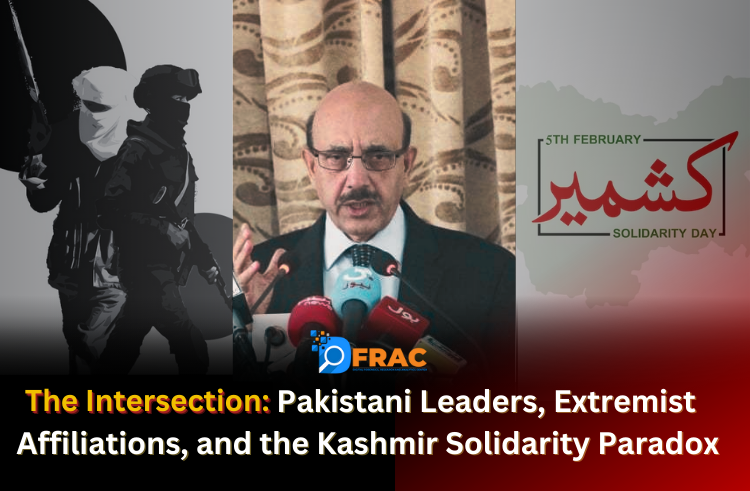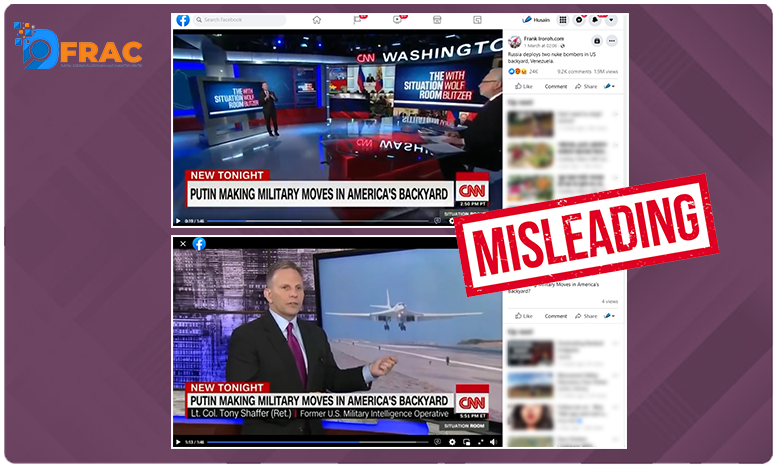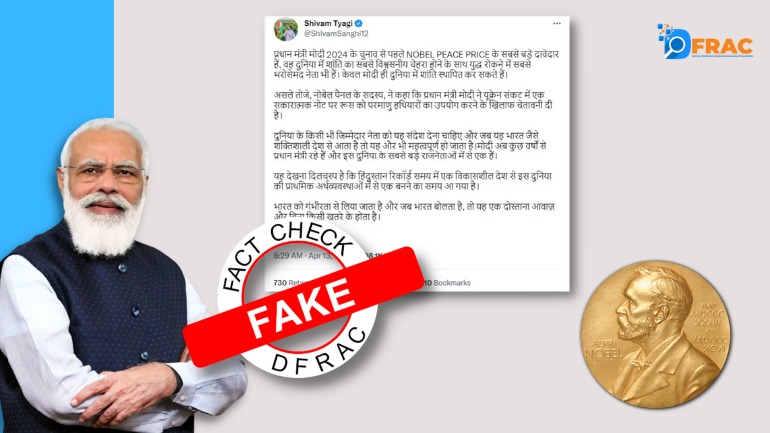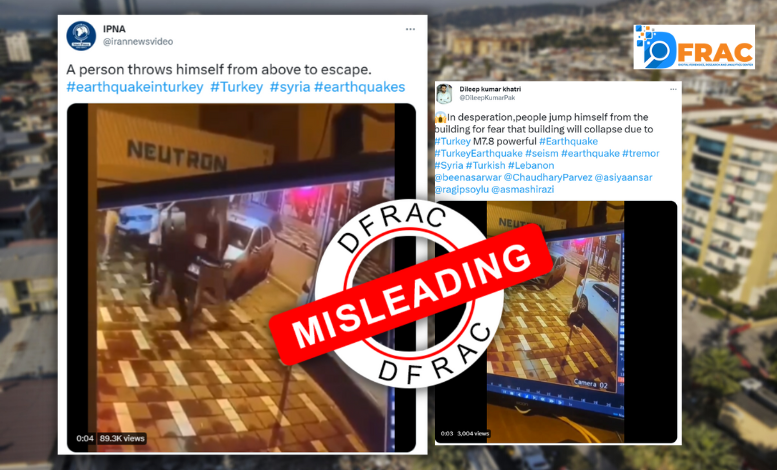Every year, Pakistan gears up for its Kashmir event with rallies, posters, and fervently proclaims ‘freedom’ in Kashmir, exacerbating tensions. Each year, the crowds dwindle, and this year has been lackluster. The event serves as a smokescreen, diverting attention from the plight of Pakistan-occupied Kashmir.
This report will unfold the network of Pakistani leaders who commemorated Kashmir Solidarity Day and possess deep-rooted connections with terrorist organizations.
The Genesis of Kashmir Solidarity Day
Kashmir Solidarity Day had its genesis in 1990 when Qazi Hussain Ahmad of Jamaat-e-Islami Pakistan, initiated it. Nawaz Sharif’s ascent to power in the preceding year, with Jamaat’s support, further solidified its association.
However, does the event still carry the Jamaat’s imprint?
Jamaat-e-Islami’s Role:
A prominent Islamist political party in Pakistan, has been instrumental in organizing events related to Kashmir Solidarity Day. This year witnessed Jamaat E Islami leader, Siraj Ul Haq, orchestrating a rally in Pakistan to demonstrate solidarity with Kashmir.


In 2023, Khalid Mahmood, the former Amir of JI and presently residing in the UK, was observed participating in a rally held in the UK to mark Kashmir Solidarity Day.

At another conference in Birmingham, he was observed criticizing the G20 summit taking place in Kashmir.

For years, Jamaat has been advancing its agenda in PoK under the guise of Kashmir Solidarity Day, orchestrating rallies while neglecting the demands and rights of the citizens. In 2019, Jamaat e Islami arranged the Azaadi March in Kashmir, with all its leaders in attendance. Notably, Sardaar Masood Khan served as the guest speaker at their rally.
Who is Masood Khan?
Masood Khan, the former President of Pakistan-occupied Kashmir (PoK), stands at the intersection of diplomatic relations, regional politics, and extremist ideologies. Khan’s experience as a former Pakistani foreign service official and ambassador to the United Nations and China may suggest a sense of statesmanship and diplomatic elegance, his track record portrays a starkly different narrative. Far from embodying the spirit of diplomacy, Khan emerges as a contentious figure with deep-seated ties to Islamist groups in the West and militant factions in the East.
Having served as the former President of PoK, it is undeniable that Masood Khan is linked to Jamaat E Islami. As previously stated, Khan participated as a speaker at Jamaat E Islami’s Azadi March in 2019, alongside Siraj Ul Haq and Khalid Mahmood.

Khan boasts a plethora of jihadist connections. In July 2021, during his tenure as PoK president, he issued a “special message” on the “fifth death anniversary” of Burhan Wani, a commander of Hizbul Mujahideen, a U.S.-designated terrorist organization. Wani fervently advocated for Kashmiris to “join the holy war” against India, enticing them with the “promise of a fulfilled life hereafter.”
At the commemoration event, Masood Khan proclaimed: “Today, we lament for Burhan Wani… He remains etched in our hearts, having sacrificed his life for a noble cause.” Pakistani media reports suggest that Khan hailed Wani as a “paragon for freedom fighters worldwide” and asserted that “the liberation of Kashmir and a defeat of India is the writing on the wall”

Wani isn’t the sole Hizbul Mujahideen jihadist whom Khan holds in high regard. In June 2017, following the U.S. State Department’s decision to brand the terrorist organization, mainstream Pakistani media reported that the “AJK President voiced complete support for Hizbul Mujahideen.” Khan further asserted that U.S. sanctions against the terrorist group’s leader, Syed Salahuddin, were “unjustified.”
Note: Salahuddin also chairs the United Jihad Council, a Kashmir umbrella group for terrorists endorsed by the Pakistani regime.

Hizbul Mujahideen is not the sole terrorist organization that Khan is confederate with. In 2019, Khan, alongside Prime Minister’s special assistant on Information and Broadcasting Firdous Ashiq Awan, actively participated in the All Parties Kashmir Solidarity Conference in Islamabad. Khan shared the platform with Fazlur Rehman Khalil, founder of Harkat-ul-Mujahideen (HuM), which the U.S. State Department designated as a terrorist organization in 1997.
Note: Khalil himself was named a Specially Designated Global Terrorist by the U.S. in 2014.

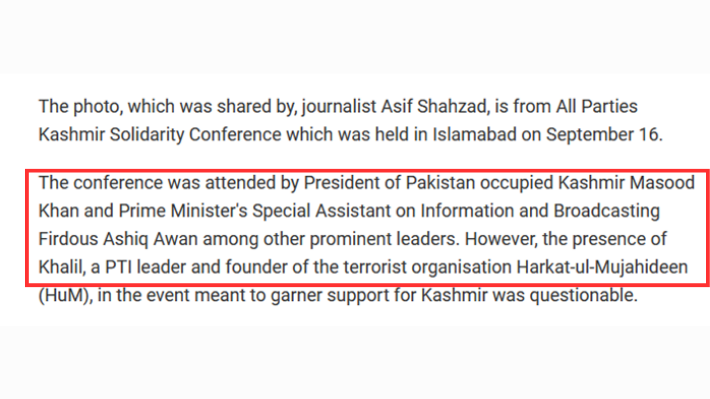
In 2020, Khan sought assistance from Khalil to advance its objectives in Kashmir.

In cahoots with extremists abroad
Khan’s alignment with extremists transcends his native territory. The former ambassador has also collaborated with Islamists associated with terrorism outside of Pakistan.
IHH (IHH Humanitarian Relief Foundation, Istanbul)
In 2019, journalist Abdullah Bozkurt shared images of Masood Khan “paying a visit to the Turkish intelligence-linked charity organization #IHH, accused of dispatching arms and supplies to jihadist groups linked to al-Qaeda in #Syria & #Libya. IHH conducts operations in the Kashmir area.”
Note: Branches of the IHH have been officially labeled as terrorist organizations in Germany, the Netherlands, and Israel. Furthermore, the organisation had links with AlQaeda and Muslim Brotherhood.


Helping Hand for Relief and Development (HHRD)
Even Islamist operatives across the Western world have fostered intimate connections with Masood Khan. Throughout Khan’s term as AJK president, extremist charities such as Helping Hand for Relief and Development (HHRD) received consistent accolades from him and his official office, which staunchly affirmed its commitment to “cooperation” with the organization.


Helping Hand for Relief and Development (HHRD) is one of the notable American Jamaat e Islami organizations which stands as an international aid charity . Established in 2005, HHRD managed to amass an astounding $40 million annually by 2015.

In December 2017, HHRD coordinated a conference at a government-run college in the Pakistani city of Timergara. The event received sponsorship from other organizations, including the Falah-e-Insaniat Foundation and the Milli Muslim League, the charitable and political wings, respectively, of the infamous Pakistani terrorist organization Lashkar-e-Taiba.
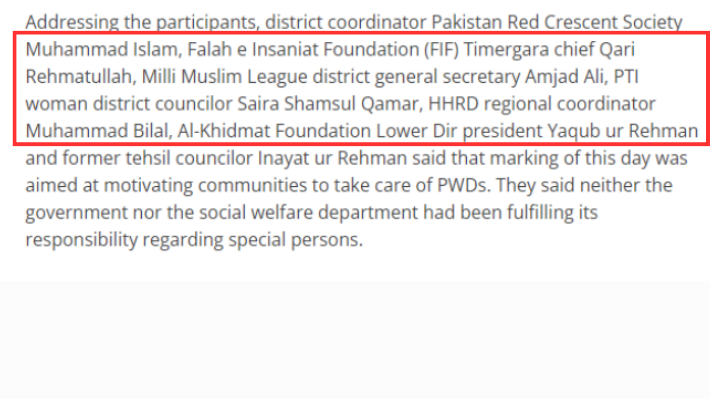
Note: In 2016, the U.S. government designated the Falah-e-Insaniat Foundation as a terrorist organization.

Friends Of Kashmir
In 2018, he made a trip to Toronto to participate in a Kashmir solidarity conference , contrived by the Friends of Kashmir Committee.

By 2020, Khan’s name appeared as a star speaker at an event arranged by Friends of Kashmir, in conjunction with the Pakistani embassy, alongside Islamist operatives and Pakistani-backed Sikh separatists, a connection tinged with negative implications.

Established in 2015 in Texas, Friends of Kashmir (FOK) actively calls for “Kashmiri issues” worldwide. FoK alleging atrocities perpetrated by Indian forces. Under the leadership of Ghazala Habib Khan, it operates with support from Pakistan. Ghazala, aligned with Hurriyat leaders, plays a pivotal role in US-Pakistan relations. Khan maintains a close association with Ghazala Habib, frequently sharing photos and remarks about their encounters.


Ghulam Nabi Fai
Beside all these connections, one we found with the ISI agent Ghulam Nabi Fai. Fai got involved with a new organization, the World Kashmir Awareness Forum. Following it he began to forge a partnership with Masood Khan. In May 2018, Fai’s group organized an event in D.C. to “bring attention to Indian atrocities” in Kashmir – an event where Masood Khan delivered the keynote address.
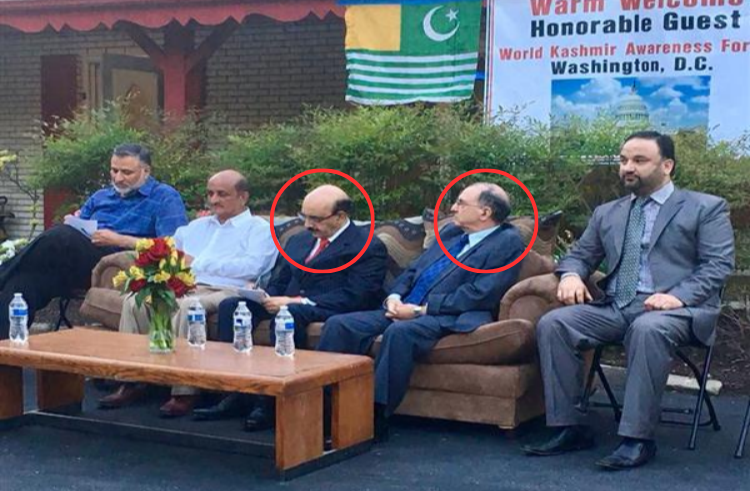
His twitter post also embraced the Fai’s organisations’s event. The Event was of augmenting fuel to fire in Kashmir in the name of Jihad & Aazadi.

In 2011, Ghulam Nabi Fai faced accusations from American prosecutors of acting as a covert operative for the Pakistani government. Fai admitted his guilt and acknowledged significant communication with Pakistan’s Inter-Services Intelligence (ISI). It was revealed that the ISI had conveyed $3.5 million to Fai and his group, the Kashmiri American Council.


Concerns Raised by U.S. Congressmen:
Seeing all his affiliations, 3 US congressmen issued a letter to President Biden. The letter concern over Pakistan’s Ambassador to the US, Masood Khan, citing his alleged support for US-designated terrorist groups. They highlight Khan’s alleged support for terrorist groups. Further, call for a thorough investigation into potential violations of FARA, emphasizing the need for transparency and accountability in diplomatic engagements.

Conclusion:
As Kashmir continues to be a flashpoint in South Asia, so does Pak leaders solidarity with terror groups. The celebration of Kashmir Solidarity Day serves as a platform for propagating extremist agendas. Additionally diverting attention from critical issues, including the rights of people in Pakistan-occupied Kashmir (PoK). In essence, the convergence of Pakistani leaders’ association with terrorist groups and their fervent endorsement of Kashmir Solidarity Day reflects a complex web of political, diplomatic, and extremist interests.


